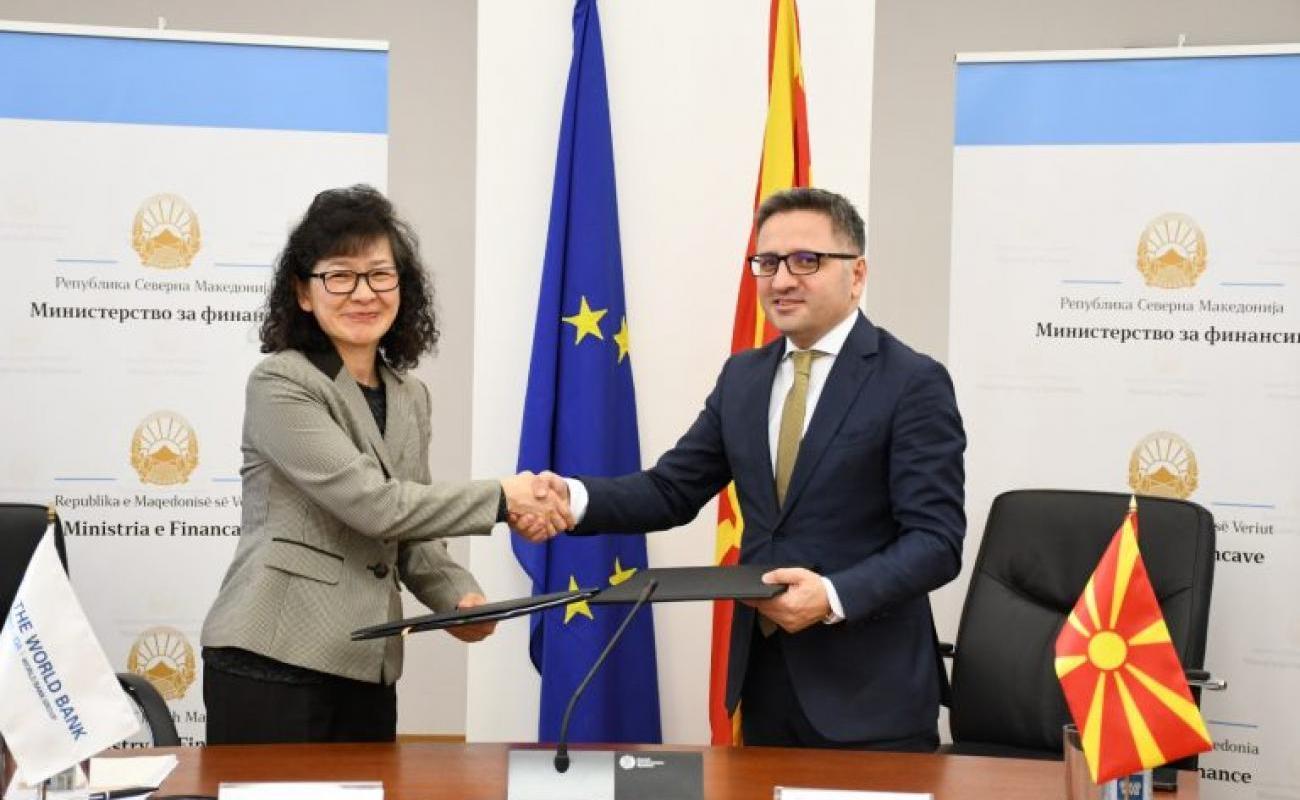Besimi and Xiaoqing Yu signed Agreement for EU Grant aimed at co-financing the WB Agriculture Modernization Project

2nd December 2022, Skopje – Republic of North Macedonia was allocated EUR 4 million as EU grant aimed at co-financing the WB Agriculture Modernization Project, worth EUR 46 million. Today, in the Ministry of Finance, the Agreement for EU Grant, was signed between Minister of Finance, Fatmir Besimi and Xiaoqing Yu, WB Country Director for the Western Balkans. Signing ceremony was attended by Minister of Agriculture, Forestry and Water Economy, Ljupcho Nikolovski, World Bank Country Manager for North Macedonia and Kosovo, Massimiliano Paolucci and EU Ambassador David Geer.
Grant of EUR 4 million, as well as EUR 4.5 million under the WB Project, will be used for setting up a modern system for safe disposal of animal by-products. It is aimed at protecting the environment and reducing the adverse impact of dumping this waste in the landfills.
Upon signing the Agreement, Minister of Finance, Fatmir Besimi pointed out that the agriculture sector modernization in our country is one of the Government’s priorities and that the support intended therefor is of great significance.
“This Agreement provides for supporting our activities to modernize this sector, being part of our program and the EU integration process. We, as a Government, provide significant support to this sector, all to the end of boosting the competitiveness and increasing the domestic production. As of next year, new subsidy system will also be put into place, geared towards more efficient distribution of the funds and greater effects generated thereby”, Minister Besimi said.
World Bank Country Manager for North Macedonia and Kosovo, Massimiliano Paolucci pointed out that the World Bank Agriculture Modernization Project (EUR 46 million) aims to improve the competitiveness of North Macedonia’s agriculture sector and strengthen public institutions in the framework of the country’s accession process to the EU.
“Aligning food safety standards with EU requirements is essential to successfully grow the food-processing industry and free the movement of agricultural produce in the market. This will also enhance the traceability of the products origin and processing which will improve access to market”, Paolucci pointed out.
“Implementation of the Agricultural Modernization Project financed by World Bank is part of our long-term policy to ensure reliable and safe healthy food supply chains for our citizens. Apart from the system for safe disposal of animal by-products, within the Project, we will build two purchasing and distribution centers in Strumica and Resen and put a logistics and distribution platform in place in Skopje. I would like to hereby express my utmost gratitude to the World Bank and the EU Delegation for the support they extend not only for this Project, but also for the whole process of our country on its road to sooner EU accession”, Minister of Agriculture, Forestry and Water Management, Ljupcho Nikolovski said.
“EU provided EUR 4.5 million grant that would complement the EUR 4.5 million WB loan for rendering plant construction and setting up a modern system for collection, and treatment of animal by-products, according to the highest EU standards”, Geer pointed out.
He went on that the agriculture and food production are very important sectors for the socio-economic development, as well as for the employment in the country, thus, the European Union will undoubtedly continue to provide substantial funds for this important sector in the years to come.
Agriculture Modernization Project is part of the 2019 – 2023 Country Partnership Framework. Project is worth EUR 46 million, and with today’s signed Agreement, the EU co-finances another EUR 4 million. Project is aimed at boosting the competitiveness in targeted agricultural sub-sectors, as well as strengthening the institutional capacities of the agricultural sector for getting access to European Funds. Project comprises four components related to promoting the competitiveness in the agricultural sector, providing access to trainings and advisory services, setting up systems for distribution of agricultural products and food, and strengthening the institutional capacities for EU accession.
